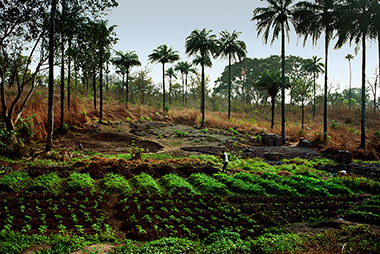“Essentially, all life depends upon the soil … There can be no life without soil and no soil without life; they have evolved together.” – Charles E. Kellogg, USDA Yearbook of Agriculture, 1938.
Silver bullet innovations for improving food security and smallholder livelihoods, such as drought resistant crop varieties, fertilizer inputs, and access to credit, generally ignore the more formidable global challenge of soil and land conservation. It takes millennia to develop fertile soils, but according to authors of a chapter on soils in the 2016 Global Food Policy Report, we are losing 75 billion tons of soil globally each year, with impacts that not only hurt poor farmers, but extend well beyond the farm (see Figure 1 below).
Sustainable management of soils and land supports agricultural productivity, food security, climate change mitigation and resilience, and a range of ecosystem services. Indeed, many of the Sustainable Development Goals (SDGs) are closely related to soil health—SDG 15 specifically calls for halting and reversing land degradation by 2030. Given the fundamental importance of healthy soils, the authors offer a promising roadmap for improving soil health.
Sustainable intensification
Sustainable intensification—producing more food from existing farmland while reducing environmental impact—is the prevailing paradigm as the world’s population heads toward 9.6 billion by 2050. Carefully designed, site-specific intensification (SI) technologies require a more complex “whole-farm” approach, although the benefits can be substantial. For example, evidence from the “doubled-up” legume technology tested by Africa RISING in Malawi shows that by growing an additional legume, because legume crops increase soil fertility, farmers successfully doubled both farm output and soil fertility benefits. Similarly, in Tanzania technologies including integrated soil fertility management and crop diversification through intercropping and integration of high-value vegetable crops have boosted farmers’ earnings by 70 percent.
Climate-smart agriculture
Climate-smart agriculture is an umbrella term that includes many farming approaches and embraces three pillars: (1) sustainable increases in crop productivity, (2) enhanced resilience and adaptation of farming systems, and (3) mitigation of greenhouse gas (GHG) emissions. IFPRI researchers have developed a modeling framework in which crop modeling analyses are used to simulate a stress test for farming systems and to identify best responses to climate and market risks. In addition, ongoing IFPRI research is focusing on the global effects of widespread adoption of climate-smart agriculture practices on production of major crops, GHG emissions, and food security.
Payment for Ecosystem Services
Payment for ecosystem services (PES) programs can help land users internalize off-farm benefits generated by sustainable land management practices. Strong local and national institutions that ensure land tenure and a market-based program for payments are required for success. For example, the Plan Vivo projects in Africa have implemented a number of successful PES programs rooted in community-based forest management practices. Mozambique’s Sofala Community Carbon program pays farmers for on-farm carbon sequestration. Costa Rica’s political constitution and its 1996 Forestry Act provide a framework for rewarding land users who provide off-farm ecosystem services through certified forest conservation. All of this has led to successful restoration of deforested lands and other sustainable natural resource management practices.
While the impact of soil and land degradation presents a formidable global challenge, momentum is gathering around the world to promote healthy soil and sustainable land management. As the authors point out, climate-smart agriculture technologies and management practices that promote sustainable intensification, supported by landscape-level approaches and economic valuation of ecosystem services, provide reason to be optimistic about sustainable management of soil and land, and ultimately food security for future generations.







